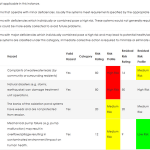Sanitation Safety Planning for Safe Use of Wastewater in Agriculture – Interactive Learning Activity at World Water Day Durban
A Sanitation Safety Planning (SSP) thematic session was held at the World Water Day Summit in Durban, South Africa on 22nd March 2017. The objective of the session was to rapidly demonstrate the principles and application of SSP to sanitation practitioners, and discuss policy issues at both South African and international level. The session was led by World Health Organization and Emanti Management, in collaboration with eThekwini Metropolitan Municipality (host city).
In May 2015, WHO launched the Sanitation Safety Planning (SSP) manual. SSP is a step-by-step risk based tool to ensure that sanitation systems are safety managed. As the sanitation sector moves towards “safely managed sanitation” under the SDGs actors in faecal sludge management need to consider what “safely managed” means for service delivery model and how to incorporate this into daily operations with all actors along the sanitation chain. SSP assists users to systematically identify and manage health risk along the sanitation chain and prioritises system improvements and monitoring based on health risks. It provides assurance to authorities and the public on the safety of sanitation-related products and services based on sound management and monitoring processes. Importantly, SSP coordinates efforts of stakeholders along the sanitation chain.
The SSP session aimed at introducing SSP and South African current practice (W2RAPs), and engaging audience members in a fun and interactive session to demonstrate the concepts and application of the SSP for safe use of wastewater in agriculture. The interactive exercise was followed by an open discussion on policy level implications for national authorities, the relevance of SSP to South Africa, and alignment of South African current practice to global norms. Expected session outcomes included:
- Participants understand how SSP can be used to ensure and monitor the safety of sanitation systems – to protect sanitation workers, the public, and people using products derived from sanitation waste.
- Participants understand how SSP might be applied in their field of work to systematically improve and monitor health risks.
Following the brief introductory presentations, the participants were led through an interactive session that included roleplaying by the audience of the Newtown SSP Case Study, and identification of SSP risks by the audience and associated feedback. Following the interactive session, noted SSP observations by audience members included:
- It is complex, with many inter-dependencies and various role players
- Co-ordination and assigning responsibilities could be a challenge
- Controlling actions and adequate monitoring are essential (but also potentially a challenge)
Informal feedback by participants showed that the session was very well received, and participants noted that the interactive learning activity was an excellent teaching mechanism.













